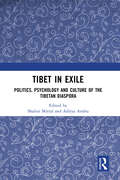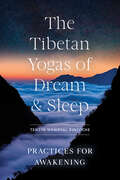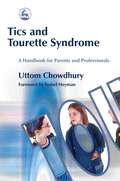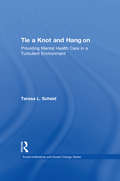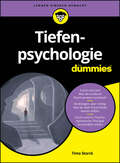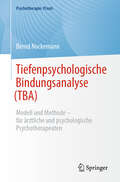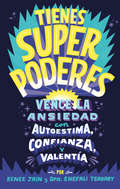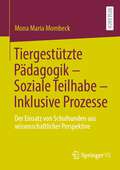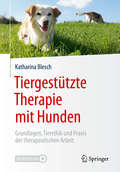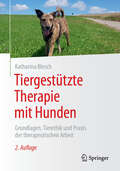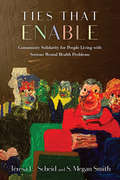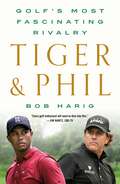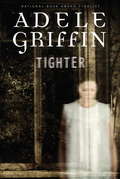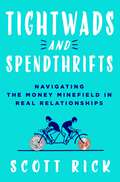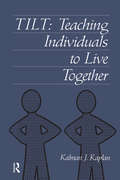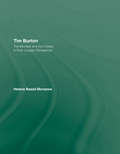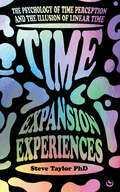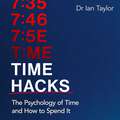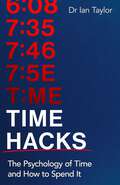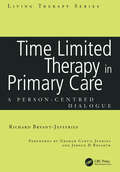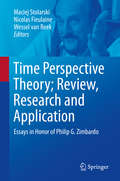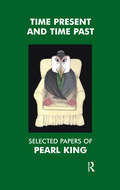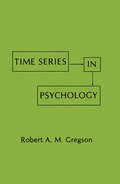- Table View
- List View
Tibet in Exile: Politics, Psychology and Culture of the Tibetan Diaspora
by Shalini MittalThis book delves deep into the lived experiences of the Tibetan diaspora, offering an insightful exploration through the intersecting lenses of politics, psychology, and culture. Drawing from the expertise of scholars in fields such as political science, sociology, psychology, and cultural studies, the book provides a rich, multidisciplinary analysis that reveals the complexities of Tibetan life in exile. It meticulously examines the delicate diplomacy between the Tibetan government-in-exile and host nations, unraveling the intricate political dynamics that shape the aspirations and challenges faced by Tibetans abroad. In addition to political analysis, the book sheds light on the psychological resilience and cultural innovation within the Tibetan community. Through an exploration of art, music, literature, and religious practices, it uncovers how Tibetans have creatively reimagined and redefined their cultural identity in the face of displacement and adversity. This volume is an essential resource for students, researchers, and educators in anthropology, political science, sociology, psychology, and cultural studies. It also serves as a valuable tool for policymakers, advocates, and activists engaged in issues of diaspora, migration, human rights, and social justice. For anyone seeking to understand the profound impact of exile, the endurance of cultural identity, and the strength of community, this book is a must-read. This version aims to be more engaging while clearly defining the book’s scope, relevance, and target audience.
Tibetan Yogas of Dream and Sleep, The: Practices for Awakening
by Tenzin Wangyal RinpocheDeepen your awareness through the practice of Tibetan dream and sleep yoga."If we cannot carry our practice into sleep, if we lose ourselves every night, what chance do we have to be aware when death comes? Look to your experience in dreams to know how you will fare in death. Look to your experience of sleep to discover whether or not you are truly awake."—Tenzin Wangyal Rinpoche We spend a third of our life sleeping and it is common, in many spiritual traditions throughout the world, for the world of dream and sleep to be utilized on the path to awakening. Dream yoga in the Tibetan traditions of dream practice has been the primary support for the realization of many yogis and great Tibetan masters. Now, updated and presented with fresh insight born from years of teaching this practice to Westerners, Tenzin Wangyal clearly presents a powerful method for liberation. With clearly illustrated Tibetan syllables and the places they are to be visualized, this practical guide will be of use to both new and adept practitioners.
Tics and Tourette Syndrome: A Handbook for Parents and Professionals
by Uttom ChowdhuryThis essential guide to tic disorders and Tourette Syndrome tackles problems faced both at home and at school, such as adjusting to the diagnosis, the effect on siblings and classroom difficulties. Dr Chowdhury offers advice on how to manage symptoms, describing practical techniques such as habit reversal and massed practice and reviewing available medical treatments. In clear, accessible language, this book explains the clinical signs and symptoms of Tourette and related conditions, and their possible causes. Presenting strategies for dealing with associated difficulties, including low self-esteem, anger-management and bullying, this book will be invaluable to parents, teachers, social workers and other professionals.
Tie a Knot and Hang on: Providing Mental Health Care in a Turbulent Environment
by Teresa ScheidTie a Knot and Hang On is an analysis of mental health care work that crosses the borders of diverse sociological traditions. The work seeks to understand the theoretical and empirical linkages between environmental pressures and activities and how these intersect with organizations and individuals. The work draws upon a research tradition that sees the issue of mental health care in terms of institutional pressures and normative values. The author provides a description and a sociological analysis of mental health care work, emphasizing the interaction of professionally generated norms that guide the "emotional labor" of mental health care workers, and the organizational contexts within which mental health care is provided. She concludes with a discussion of emerging institutional forces that will shape the mental health care system in the future. These forces are having greater impact than ever before as managed care comes to have a huge fiscal as well as institutional impact on the work of mental health professionals. Scheid's book is a brilliant, nuanced effort to explain the institutional demands for efficiency and cost containment with the professional ethics that emphasize quality care for the individual. The book is essential reading for those interested in mental health care organizations and the providers responding to these seemingly larger, abstract demands. The work offers a rich mixture not just of the problems faced by mental health care personnel, but the equilibrium currently in place u an equilibrium that shapes the theory of the field, no less than the activities of its practitioners. Teresa L. Scheid is associate professor of sociology, at the University of North Carolina at Charlotte. She has published widely in the area, including major essays in Sociology of Health and Illness, Sociological Quarterly, Perspectives on Social Problems, and The Journal of Applied Behavioral Science.
Tiefenpsychologie für Dummies (Für Dummies)
by Timo StorckDieses Buch erklärt wie die Tiefenpsychologie aus der Psychoanalyse entstanden ist und warum sie sich zur am zweithäufigsten angewendeten Therapiemethode gemausert hat. Sie erfahren was es mit Schlagworten wie Verdrängung, Sexualität und Fehlleistung auf sich hat, wie eine tiefenpsychologische Therapie abläuft, wie sie wirkt und für wen sie überhaupt in Frage kommt. Auch ein Blick in den Alltag kommt nicht zu kurz. Sie werden erstaunt sein, welche Bedeutung die Psychoanalyse in Kultur und Politik spielt.
Tiefenpsychologische Bindungsanalyse: Modell und Methode – für ärztliche und psychologische Psychotherapeuten (Psychotherapie: Praxis)
by Bernd NockemannDiese Monografie wagt den Versuch, die Durcharbeitung der frühen, prägenden Bindungserfahrungen für das Setting der tiefenpsychologisch fundierten Psychotherapie zu erschließen. Der Autor lässt uns teilhaben an seinen Überlegungen zu einem streng naturwissenschaftlich gedachten Aufbau unserer aller Entwicklungs- und Veränderungsbedingungen, vom einfachen Reflex bis zur komplexen Bindungsbeziehung. Aus dem Inhalt: Die auffälligen Überschneidungen der Bindungstheorie und der Selbstpsychologie bilden den Kern der grundlegenden theoretischen Weiterentwicklung des psychodynamischen Modells. Mit den Begrifflichkeiten der Bindungstheorie gelingt es dem Autor, die Modellvorstellungen der Selbstpsychologie um entscheidende Elemente zu ergänzen. Psychodynamische Therapien werden mit der TBA überschaubarer, leichter zu handhaben (mit konkreten Fragen zur Bindungsgeschichte) und wirkungsvoller. Mit einem Geleitwort von Klaus E. Grossmann. Über den Autor: Bernd Nockemann ist niedergelassener Arzt für Psychosomatische Medizin und Psychotherapie in Radevormwald. Sein Anliegen ist, die Methode der Tiefenpsychologischen Bindungsanalyse den psychodynamisch orientierten Kolleginnen und Kollegen auf einer theoretisch gut fundierten und verständlichen Basis nutzbar zu machen. In seiner Freizeit liebt Bernd Nockemann Sport und das Zusammensein mit seiner Familie und Freunden am selbstgebauten Pizzaofen sowie die Interpretation gepflegter Polyphonie, von klassischen Oratorien bis Comedian Harmonists.
Tienes superpoderes: Vence la ansiedad con autoestima, confianza y valentía
by Renee Jain Dra. Shefali TsabaryTienes superpoderes, el bestseller internacional que ha ayudado a miles de niños a ser más felices. «Renee Jain y la Dra. Shefali son la combinación perfecta que te ayudará a superar la ansiedad y a vivir, como mereces, una vida plena», Miriam Tirado ¿Alguna vez te has sentido…... hiperpreocupado? ... megaestresado? ... sobrepasadísimo? Probablemente ya no lo recuerdes, pero hubo un momento en el que tuviste superpoderes. Vivías en el presente, eras original, actuabas con desenvoltura, tenías energía y eras resiliente. En resumen: disfrutabas cada día. Pero poco a poco esos superpoderes se fueron agotando. De repente, empezaron a asaltarte las dudas, las preocupaciones y la ansiedad.No estás solo; nunca lo has estado. Algún día recuperarás tus superpoderes y estás más cerca de lo que crees.Ciencia, trucos, consejos y un montón de datos para ver el mundo desde otro punto de vista. Estas son las claves que encontrarás en este libro para aprender a lidiar con la presión del colegio, las notas y la vida en general.Convierte tu ansiedad en coraje y tu preocupación, en confianza en ti mismo. Bienvenido al viaje. Un libro para ayudar a los niños y jóvenes a partir de 7 años a manejar la ansiedad y el estrés y mejorar su autoestima. Incluye ejercicios, consejos y ejemplos prácticos, de la mano de dos autoras referencia en el tema, la doctora Shefali Tsabary, autora best seller de The New York Times, y Renee Jain, fundadora de Go Zen y maestra de paternidad consciente a nivel internacional. Reseña:«La Dra.Shefali combina maravillosamente herramientas modernas y sabiduría ancestral para retornar la calma en el corazón de tus hijos/as»Miriam Tirado, autora de El hilo invisible
Tiergestützte Pädagogik – Soziale Teilhabe – Inklusive Prozesse: Der Einsatz von Schulhunden aus wissenschaftlicher Perspektive
by Mona Maria MombeckLehrkräfte setzen Hunde im Unterricht ein, um die soziale Inklusion zu fördern. Doch welchen Einfluss hat tiergestützte Pädagogik auf die sozialen Strukturen in Schulklassen? Wie lassen sich diese Einflüsse erklären und welche Schlussfolgerungen können für die Förderung von sozialer Inklusion abgeleitet werden? Diese Fragen werden mit einer der ersten empirischen Erhebungen zu Auswirkungen tiergestützter Pädagogik auf die soziale Partizipation von Schüler*innen beantwortet. Der Einfluss von Schulhunden wird gezielt hinsichtlich des Wohlbefindens, der Arbeitsatmosphäre und sozialer Beziehungen zwischen den Lernenden, aber auch zwischen Klasse und Lehrkraft erhoben. Die Analyse der Ergebnisse zeigt: Mithilfe von tiergestützter Pädagogik werden soziale Strukturen positiv beeinflusst und Teilhabemöglichkeiten geschaffen. Vor dem Hintergrund pädagogischer und soziologischer Theorien werden die Ergebnisse interpretiert und erklärt. Leser*innen erhalten praktische Hinweise für die Förderung sozialer und emotionaler Entwicklung von Kindern und Jugendlichen sowie für die Vermittlung inklusiver Werte und die Beziehungsgestaltung.
Tiergestützte Therapie mit Hunden: Grundlagen, Tierethik und Praxis der therapeutischen Arbeit
by Katharina BleschDie tiergestützte Therapie ist seit einigen Jahren in aller Munde und wird immer häufiger auch in die psychotherapeutische Behandlung von Menschen integriert. Doch wie genau können Therapiebegleithunde die psychotherapeutische Arbeit erweitern und unterstützen? Wie lassen sich dabei Tierschutz und Menschenwohl vereinen? Welche Hunde eignen sich für den Einsatz als Therapiebegleithund und wie werden sie auf ihren Einsatz vorbereitet?Mit diesem Fachbuch erhalten Sie einen praxisnahen und lebendigen Einblick in die therapeutische Arbeit mit Hunden. Neben einem Überblick über die Grundlagen sowie tierschutzrechtliche und ethische Aspekte der hundegestützten Therapie von Menschen werden konkrete Übungen im Rahmen eines hundegestützten Selbstsicherheitstrainings bildhaft und per Video beschrieben und geben so Inspiration für die therapeutische Arbeit mit Mensch und Tier in verschiedenen Institutionen und Situationen.
Tiergestützte Therapie mit Hunden: Grundlagen, Tierethik und Praxis der therapeutischen Arbeit
by Katharina BleschDie tiergestützte Therapie ist seit einigen Jahren in aller Munde und wird immer häufiger auch in die psychotherapeutische Behandlung von Menschen integriert. Doch wie genau können Therapiebegleithunde die psychotherapeutische Arbeit erweitern und unterstützen? Wie lassen sich dabei Tierschutz und Menschenwohl vereinen? Welche Hunde eignen sich für den Einsatz als Therapiebegleithund und wie werden sie auf ihren Einsatz vorbereitet? Mit diesem Fachbuch erhalten Sie einen praxisnahen und lebendigen Einblick in die therapeutische Arbeit mit Hunden. Neben einem Überblick über die Grundlagen sowie tierschutzrechtliche und ethische Aspekte der hundegestützten Therapie von Menschen werden konkrete Übungen im Rahmen eines hundegestützten Selbstsicherheitstrainings bildhaft und per Video beschrieben und geben so Inspiration für die therapeutische Arbeit mit Mensch und Tier in verschiedenen Institutionen und Situationen.
Ties that Enable: Community Solidarity for People Living with Serious Mental Health Problems
by Teresa L. Scheid S. Megan SmithTies that Enable is written for students, providers, and advocates seeking to understand how best to improve mental health care – be it for themselves, their loved ones, their clients, or for the wider community. The authors integrate their knowledge of mental health care as researchers, teachers, and advocates and rely on the experiences of people living with severe mental health problems to help understand the sources of community solidarity. Communities are the primary source of social solidarity, and given the diversity of communities, solutions to the problems faced by individuals living with severe mental health problems must start with community level initiatives. “Ties that Enable” examines the role of a faith-based community group in providing a sense of place and belonging as well as reinforcing a valued social identity. The authors argue that mental health reform efforts need to move beyond a focus on individual recovery to more complex understandings of the meaning of community care. In addition, mental health care needs to move from a medical model to a social model which sees the roots of mental illness and recovery as lying in society, not the individual. It is our society’s inability to provide inclusive supportive environments which restrict the ability of individuals to recover. This book provides insights into how communities and system level reforms can promote justice and the higher ideals we aspire to as a society.
Tiger & Phil: Golf's Most Fascinating Rivalry
by Bob HarigBob Harig's Tiger & Phil provides an in-depth chronicle of the decades-long rivalry that drove the success of golf's two biggest stars, Tiger Woods and Phil Mickelson.For more than two decades, there have been two golfers who have captivated, bemused, inspired, frustrated, fascinated, and entertained us, and in doing so have demanded our attention – Tiger Woods and Phil Mickelson. Even with all the ink that has been spilled on Tiger, no one has ever written about his relationship with Phil and how their careers have been inextricably intertwined. Furthermore, very little has been written about Phil Mickelson, who is more than just an adversary. He is a fascinating Hall of Fame golfer in his own right. These two biggest names (and draws) in golf have, for better and for worse, been the ultimate rivals. But it is so much more complicated than that. Each player has pushed the other to be better. They have teased each other and fought. They have battled to the bitter end on the course making for some of the greatest moments in the game for the last 20 years. They have each gone through injury and health problems, legal problems, falling in and out of favor with the press. And over the course of their time together in the game they have gradually become not just rivals but friends.In the tradition of major bestsellers such as Arnie & Jack, When the Game Was Ours, The Rivals, and Brady vs. Manning, Tiger & Phil will change the way we look at these players and the game itself.
Tighter
by Adele GriffinWhen 17-year-old Jamie arrives on the idyllic New England island of Little Bly to work as a summer au pair, she is stunned to learn of the horror that precedes her. Seeking the truth surrounding a young couple's tragic deaths, Jamie discovers that she herself looks shockingly like the dead girl--and that she has a disturbing ability to sense the two ghosts. Why is Jamie's connection to the couple so intense? What really happened last summer at Little Bly? As the secrets of the house wrap tighter and tighter around her, Jamie must navigate the increasingly blurred divide between the worlds of the living and the dead. Brilliantly plotted, with startling twists, here is a thrilling page-turner from the award-winning Adele Griffin.From the Hardcover edition.
Tightwads and Spendthrifts: Navigating the Money Minefield in Real Relationships
by Scott RickA revolutionary guide to navigating the financial aspects of real relationshipsHave you ever asked yourself “What if I’m a tightwad and my significant other is a spendthrift?” or vice versa? Scott Rick, a behavioral scientist at the University of Michigan’s Ross School of Business, knows that many people do. He also knows that the financial aspects of an intimate relationship can become a money minefield if couples try to navigate it without first discussing all of the financial issues between them, especially if those two people have different approaches to spending.Tightwads and Spendthrifts is a science-based guide to understanding and transforming how we manage money, both on our own and in relationships. Building on his original research, and surveying a vast body of interdisciplinary work, Tightwads and Spendthrifts will help you understand your own financial psychology and how it plays out in your relationships. Can tightwads and spendthrifts live together in harmony? Rick says “yes,” but not without first asking hard questions about whose opinion should count most when making a financial decision. After all of the issues have been aired, he tells readers how to create a game plan for navigating financial decision making that both Tightwads and Spendthrifts can rely on for a happy life together.
Tilt: Teaching Individuals To Live Together
by Kalman J. KaplanAn alternative to existing bipolar choices, this book looks at individuals and their distances from the self (individuation-deindividuation) and from others (attachment-detachment). Simultaneously theoretical, empirical, and applied, this book can be reasonably applied to all types of individuals involved in interpersonal situations regardless of culture, age, gender, or sexual orientations. Broken into four parts, In the first part, Definitions and Measurements, the author includes an introduction to the Individuation-Attachment Questionnaire.Implications of TILT for Individuals is the basis for part two and includes a view of TILT across the life span. The next section extends the analysis to TILT for Couples and Families. The clinician, counselors, and individuals attempting to help himself/herself are addressed in the final part: TILT for the Clinician and includes application of TILT to everyday life.The text brings to life, through extensive description, the questions and situations consistently raised in couples therapy: space-too much or not enough. TILT: Teaching Individuals To Live Together presents a unique model of individuation and attachment and was developed to facilitate the understanding of the complex relationship between these two developmental processes across the life span. The model shows how we gradually develop our boundaries and hence reduce the need for defensive interpersonal walls. The TILT Model has applications in the fields of therapy, education, and organizational development. Thus, it will be of interest to mental health professionals including psychotherapists, psychologists, counselors, social workers, and marriage and family therapists. Practitioners of transactional analysis will find this book of supreme interest and usefulness.
Tim Burton: A Post-Jungian Perspective
by Helena Bassil-MorozowTim Burton’s films are well known for being complex and emotionally powerful. In this book, Helena Bassil-Morozow employs Jungian and post-Jungian concepts of unconscious mental processes along with film semiotics, analysis of narrative devices and cinematic history, to explore the reworking of myth and fairytale in Burton’s gothic fantasy world. The book explores the idea that Burton’s lonely, rebellious ‘monstrous’ protagonists roam the earth because they are unable to fit into the normalising tendencies of society and become part of ‘the crowd’. Divided into six chapters the book considers the concept of the archetype in various settings focusing on: the child the monster the superhero the genius the maniac the monstrous society. Tim Burton: The Monster and the Crowd offers an entirely fresh perspective on Tim Burton’s works. The book is essential reading for students and scholars of film or Jungian psychology, as well as anyone interested in critical issues in contemporary culture. It will also be of great help to those fans of Tim Burton who have been searching for a profound academic analysis of his works.
Time Expansion Experiences: The Psychology of Time Perception and the Illusion of Linear Time
by Steve TaylorHave you ever been in an accident and felt that time slowed down? Have you felt time stretch radically, or even apparently disappear, in a state of deep meditation? Psychologist Dr Steve Taylor calls these Time Expansion Experiences, and in this book he shares his years of research into this life-changing phenomenon.Most of us will have experienced a TEE, an experience of time slowing down in an extreme situation, and yet it is a phenomenon that has never been fully explored or explained - until now.Psychologist Dr. Steve Taylor has spent several years analysing &“time expansion experiences&” (or TEEs), after collecting hundreds of reports. He has also found many examples of "time cessation experiences" (or TCEs), in which time appears to disappear altogether. In this book he shares the fascinating psychology and shared features behind all of these case studies, coming to an incredible conclusion: TEEs are a real altered state of consciousness, rather than a trick of recollection. Not only this, but TEEs and TCEs are almost always positive, with a sense of calm well-being, clarity and heightened awareness. In this ground-breaking book, discover profound implications: What do unusual states of consciousness such as mystical experiences, psychedelic experiences, and near-death experiences tell us about time and consciousness?What can the countless reports of &“life review&” - when people view a whole lifetime of events and experiences within a few seconds - tell about the past, present and the future?What does modern physics have to say about the idea that linear time is illusory?If our perception of time is an illusion, is it possible to speed up and slow down time at will, including inducing TEEs?
Time Hacks: The psychology of time and how to spend it
by Ian TaylorWe think of time as scarce and finite. We say we 'don't have enough time', that 'time is against us', and that 'time waits for no one'. But what if we could make time feel more abundant? How can we make time work for rather than against us?In Time Hacks, Dr Ian Taylor - a world-leading expert in the science of the human mind - draws on the latest psychological research to reveal how we can develop a healthier relationship to time; one where we can break free of the cycle of boredom and mania, be more productive, and bring balance to all parts of our lives.In the process, he demonstrates why all difficult tasks should be done early in the morning, the detrimental effects of relying on willpower, why we should use 'be' goals to sustain motivation, and how to replace 'dead time' with activities that nourish the soul.Fascinating and eye-opening, Time Hacks will show you how to use the power of psychology to feel less time pressured, boost your mental and physical health, and break free from the tyranny of your alarm clock.
Time Hacks: The psychology of time and how to spend it
by Ian TaylorWe think of time as scarce and finite. We say we 'don't have enough time', that 'time is against us', and that 'time waits for no one'. But what if we could make time feel more abundant? How can we make time work for rather than against us?In Time Hacks, Dr Ian Taylor - a world-leading expert in the science of the human mind - draws on the latest psychological research to reveal how we can develop a healthier relationship to time; one where we can break free of the cycle of boredom and mania, be more productive, and bring balance to all parts of our lives.In the process, he demonstrates why all difficult tasks should be done early in the morning, the detrimental effects of relying on willpower, why we should use 'be' goals to sustain motivation, and how to replace 'dead time' with activities that nourish the soul.Fascinating and eye-opening, Time Hacks will show you how to use the power of psychology to feel less time pressured, boost your mental and physical health, and break free from the tyranny of your alarm clock.
Time Hacks: The psychology of time and how to spend it
by Ian TaylorWe think of time as scarce and finite. We say we 'don't have enough time', that 'time is against us', and that 'time waits for no one'. But what if we could make time feel more abundant? How can we make time work for rather than against us?In Time Hacks, Dr Ian Taylor - a world-leading expert in the science of the human mind - draws on the latest psychological research to reveal how we can develop a healthier relationship to time; one where we can break free of the cycle of boredom and mania, be more productive, and bring balance to all parts of our lives.In the process, he demonstrates why all difficult tasks should be done early in the morning, the detrimental effects of relying on willpower, why we should use 'be' goals to sustain motivation, and how to replace 'dead time' with activities that nourish the soul.Fascinating and eye-opening, Time Hacks will show you how to use the power of psychology to feel less time pressured, boost your mental and physical health, and break free from the tyranny of your alarm clock.
Time Limited Therapy in Primary Care: A Person-Centred Dialogue (Living Therapies Series)
by Richard Bryant-Jefferies"Many counsellors who work in primary care find it difficult to explain to colleagues in the primary care team what they actually do with clients behind the closed door of their room. In this book the author brings to life in a gripping way what really does go on when a counsellor sees a patient in the primary healthcare setting. It’s good to read for once a book that describes so realistically and movingly the minute-by-minute account of what actually happens, not a book describing clever therapists getting it right all the time. The book should be required reading for newly appointed non-clinical managers of counselling services and for primary healthcare staff about to start working with a counsellor as a member of their team."— Graham Curtis Jenkins in his Foreword
Time Perspective Theory; Review, Research and Application
by Maciej Stolarski Nicolas Fieulaine Wessel Van BeekThis book is about time and its powerful influence on our personal and collective daily life. It presents the most comprehensive and up-to-date overview of contemporary knowledge on temporal psychology inspired by Zimbardo's work on Time Perspective (TP). With contributions from renowned and promising researchers from all over the globe, and at the interface of social, personality, cognitive and clinical psychology, the handbook captures the breadth and depth of the field of psychological time. Time perspective, as the way people construe the past, the present and the future, is conceived and presented not only as one of the most influential dimensions in our psychological life leading to self-impairing behaviors, but also as a facet of our person that can be de-biased and supportive for well-being and happiness. Written in honor of Philip G. Zimbardo on his 80th birthday and in acknowledgement of his leading role in the field, the book contains illustrations of the countless studies and applications that his theory has stimulated, and captures the theoretical, methodological and practical pathways he opened by his prolific research.
Time Present and Time Past: Selected Papers of Pearl King
by Pearl KingThis remarkable collection of papers is divided into three sections: clinical issues; psychoanalysis and the life cycle; and underlying theories of practice. The papers span the years 1951 to 2004, recording five decades of British psychoanalysis, through various angles. The papers in the clinical part include a unique, lengthy case study of the psychoanalysis of a four-year-old boy, and a follow-up of his life over five decades later. After reading the paper at the age of 54, the patient agreed to write his own version of his life, which is included in the book. The second part of the book, on psychoanalysis and the life cycle, includes renowned chapters on ageing. The author looks at the ageing psychoanalyst as well as the characteristics of analysis with older patients. The third part discusses the theories underlying the author's practice and puts forward her views on such concepts as alienation, transference, and the importance of time in psychoanalytic work with patients.
Time Series in Psychology
by R. A.M. GregsonFirst published in 1983. Psychological data are segments of life histories; as such they are ordered sequences of observations and by definition time series. Yet they are often anything but well behaved; what regularities and invariances they have are buried from all but the most persistent investigator. The most common methods of representing quantitative results in psychology are frozen outside time; thus they deliberately average out much of the sequential structure that holds any sparse clues to the nature of processes within the organism. This review, whose simple aim is to bring together in an illuminating juxtaposition on basic results in both time series analysis and in experimental psychology, thus. cuts across traditions within psychology.
Time Warped: Unlocking the Mysteries of Time Perception
by Claudia HammondAn award–winning BBC podcast host “has a steady touch . . . adding user-friendly charm” to “intriguing” research on the psychology of time perception (New York Times).Why does life seem to speed up as we get older? Why does the clock in your head move at a different speed from the one on the wall? Why is it almost impossible to go a whole day without checking your watch? Is it possible to retrain our brains and improve our relationship with it? In Time Warped, Claudia Hammond offers insight into how to manage our time more efficiently, how to speed time up and slow it down at will, how to plan for the future with more accuracy, and she teaches how to use the warping of time to our own benefit.“An ideal read for those looking for science-based theories of time perception without the scientific jargon. . . . Hammond demonstrates how life’s circumstances can make minutes seem an eternity and decades the blink of an eye.” —Library Journal“A well-researched meditation on how we see the future.” —Slate“This lively introduction to the psychology of time perception is an intriguing take on the fluidity of reality.” —Publishers Weekly“. . . a fascinating foray into the idea that our experience of time is actively created by our own minds and how these sensations of what neuroscientists and psychologists call “mind time” are created.” —Maria Popova, The Marginalian
